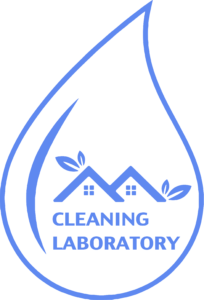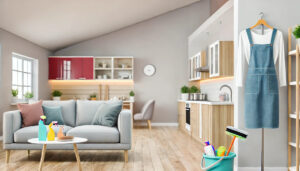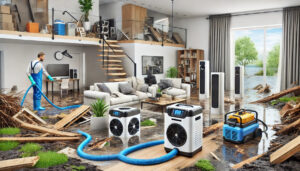Living with allergies can be challenging, especially when allergens are lurking in your home. Maintaining a clean and allergen-free environment is crucial for reducing allergy symptoms and improving overall health. In this guide, we’ll explore effective cleaning tips and strategies designed to help allergy sufferers breathe easier.
Understanding Allergens
Allergens are substances that can cause allergic reactions. Common indoor allergens include:
- Dust mites
- Pet dander
- Mold
- Pollen
These allergens can trigger symptoms such as sneezing, coughing, itchy eyes, and respiratory issues. Reducing their presence in your home is essential for allergy management.
Essential Allergy-Friendly Cleaning Methods
Hypoallergenic Cleaning Tips
Using hypoallergenic cleaning methods can significantly reduce allergens. Opt for cleaning products that are free from harsh chemicals and fragrances, as these can aggravate allergies.
Natural Cleaning Solutions for Allergies
Natural cleaning solutions, such as vinegar, baking soda, and lemon juice, are effective and safe for allergy sufferers. These solutions can be used to clean surfaces, disinfect, and deodorize your home without introducing harmful chemicals.
Reducing Allergens at Home
Dust Mite Prevention Strategies
Dust mites thrive in warm, humid environments and are commonly found in bedding, carpets, and upholstered furniture. To prevent dust mites:
- Wash bedding weekly in hot water.
- Use dust-proof covers on pillows and mattresses.
- Vacuum carpets and upholstery regularly with a HEPA vacuum cleaner.
Pet Dander Removal Techniques
If you have pets, their dander can be a significant source of allergens. To minimize pet dander:
- Bathe and groom pets regularly.
- Keep pets out of bedrooms and off furniture.
- Use air purifiers to filter out dander particles.
Allergy-Proof Bedding Cleaning
Allergy-proof bedding can create a barrier against dust mites and other allergens. Regularly washing and replacing bedding is key to keeping your sleeping environment clean.
Carpet Cleaning for Allergy Relief
Carpets can trap dust, pollen, and other allergens. For allergy relief, consider:
- Vacuuming frequently with a HEPA vacuum cleaner.
- Using a carpet cleaner or hiring professional carpet cleaning services.
- Replacing carpets with hard flooring if possible.
Effective Tools and Products
HEPA Vacuum Cleaner Recommendations
A HEPA vacuum cleaner is essential for allergy sufferers. HEPA filters trap small particles, preventing them from being released back into the air. Look for models with strong suction and good filtration systems.
Air Purifier Benefits for Allergy Sufferers
Air purifiers can help remove allergens from the air, providing relief for allergy sufferers. Choose air purifiers with HEPA filters and place them in high-traffic areas of your home.
Safe Cleaning Products for Allergies
Use cleaning products specifically labeled as safe for allergy sufferers. Avoid products with strong scents and harsh chemicals, as they can worsen allergy symptoms.
Allergy-Safe Cleaning Products
Opt for products that are natural, fragrance-free, and hypoallergenic. These products are less likely to cause reactions and are safer for sensitive individuals.
Seasonal and Routine Cleaning
Seasonal Allergy Cleaning Guide
During allergy seasons, it’s important to take extra steps to keep your home clean. This includes:
- Keeping windows closed to prevent pollen from entering.
- Regularly washing curtains and blinds.
- Dusting surfaces with a damp cloth to capture allergens.
Cleaning Routine for Asthmatics
A consistent cleaning routine can help manage asthma symptoms. Focus on high-touch surfaces, and use a vacuum with a HEPA filter to reduce airborne allergens.
Tips for Cleaning During Pollen Season
During pollen season, minimize the introduction of pollen into your home by:
- Removing shoes before entering the house.
- Showering and changing clothes after spending time outdoors.
- Using air purifiers to capture pollen particles.
Mold Prevention and Cleaning
Mold can be a serious allergen and health hazard. To prevent mold growth:
- Fix leaks and address moisture issues promptly.
- Use dehumidifiers in damp areas like basements and bathrooms.
- Clean mold-prone areas with mold-killing solutions.
Allergen-Reducing Cleaning Habits
Incorporate allergen-reducing habits into your cleaning routine to maintain a healthier home environment.
Home Cleaning Checklist for Allergies
Having a checklist can ensure thorough cleaning. Include tasks such as:
- Dusting all surfaces.
- Vacuuming carpets and upholstery.
- Washing bedding and curtains.
- Cleaning air filters and vents.
Cleaning Strategies for Respiratory Health
Maintaining clean air and surfaces is crucial for respiratory health. Regular cleaning and using HEPA filters can significantly improve air quality.
Minimizing Indoor Allergens
Consistent cleaning and using the right tools can help minimize indoor allergens, creating a healthier living environment for allergy sufferers.
Professional Cleaning vs. DIY Cleaning
While DIY cleaning can help reduce allergens, professional cleaning services offer a deeper and more thorough clean. Here are some benefits of hiring professionals:
- Expertise: Professionals have the knowledge and experience to identify and address hidden allergens.
- Advanced Equipment: Professional cleaners use high-grade equipment and products that are more effective in removing allergens.
- Time-Saving: Hiring professionals saves you time and ensures a comprehensive clean, giving you peace of mind.
DIY cleaning can be effective for regular maintenance, but for a truly allergen-free home, professional services are invaluable.
Conclusion
Maintaining a clean home is essential for managing allergies and improving your quality of life. While DIY cleaning methods can help, professional cleaning services from Cleaning Laboratory provide the expertise and thoroughness needed to create a truly allergen-free environment. Don’t let allergens control your life—contact us today through our contact form and let our professionals help you breathe easier.








